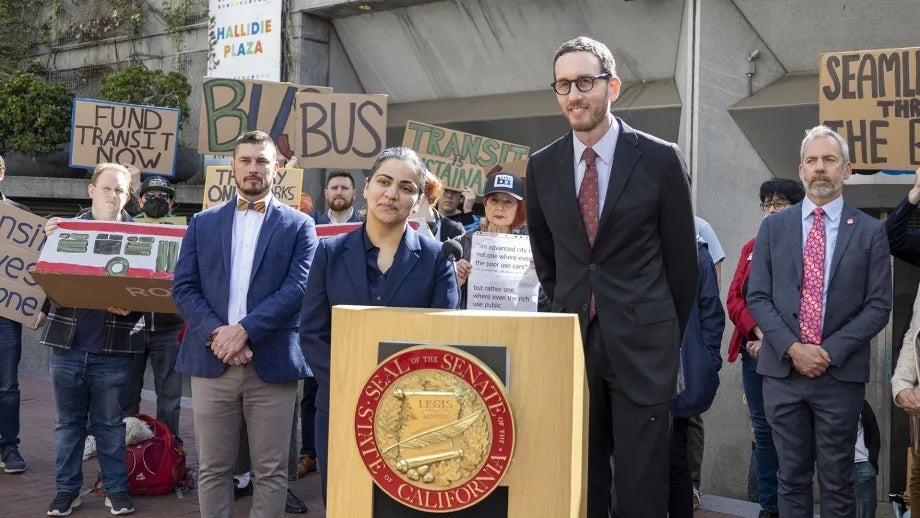New Legislation Aims to Put Future Of Bay Area Transportation in Voters’ Hands
State Senator Scott Wiener of San Francisco this week joined with State Senator Aisha Wahab of Hayward to jointly author a bill that would allow voters throughout the Bay Area to consider as early as November 2026 a comprehensive transportation revenue and reform measure that would preserve and enhance public transit operations, improve the condition of local streets and roads, and promote mobility and access for all people, including pedestrians, bicyclists and scooter and wheelchair users.
Declaring the nine-county Bay Area needs a world-class, reliable, affordable, efficient and connected transportation network that meets the needs of its residents, businesses and visitors while also helping to combat the climate crisis, Senate Bill 1031 proposes that the Metropolitan Transportation Commission (MTC) allocate at least $750 million each year to support Bay Area transit operations if voters approve a regional payroll tax, regional parcel tax, regional sales tax, or a regional vehicle registration surcharge — though the bill specifies that voters would not be asked to consider a registration surcharge before 2030.
“This legislation represents the first step in what is sure to be a long journey,” said Wiener. “Our public transportation agencies are struggling to maintain service levels and riders increasingly are asking for reforms to modernize and integrate these systems. Meanwhile, the quality of our roads has eroded and many roads are not safe for all users, including bicyclists, pedestrians and transit riders. To keep our communities connected, to keep our families connected, to keep our region connected and to make sure the Bay Area can meet its climate goals, we need to have as strong a transportation system as possible.”
SB 1031 would make MTC responsible for implementing a seamless transit experience throughout the Bay Area, and would require the Commission to adopt and update rules and regulations to promote the coordination of fares, fare-payment methods and fare integration among various transit agencies. This includes schedule coordination; mapping, wayfinding and real-time transit information as well as other customer-facing operations.
To help speed up customer-focused transit improvements, the bill includes provisions to strengthen MTC’s ability to set conditions on existing and future funding for transit agencies. The bill also requires the California State Transportation Agency to conduct an assessment of the pros and cons of transit agency consolidation within the Bay Area and to follow up that assessment with a plan to implement consolidation, which the bill defines broadly to include staff integration, not strictly organizational mergers.
“Senator Wiener and Senator Wahab deserve a lot of credit for demanding accountability from MTC and the transit agencies,” said MTC Chair and Napa County Supervisor Alfredo Pedroza. “We’re going to be asking voters for a lot of money and we need to make sure it’s invested wisely. We do need to transform our transit network and the way we pay to operate it. But we also need to transform our local streets to fix potholes and make the roads safer for walking and biking. The bill balances better connectivity without encouraging people to drive more.”
SB 1031 also would allow employers with more than 50 workers in the Bay Area to meet the requirements of the Bay Area Commuter Benefits program by providing their employees a regional transit pass. The Clipper BayPass now being piloted by MTC and Bay Area transit agencies is providing a group of more than 30,000 test users — including private and public sector employers, college students and residents of affordable housing communities — with free access to all bus, rail and ferry services in the nine-county region. Participating employers include UCSF, the City of Menlo Park and a group of Alameda businesses represented by the Alameda Transportation Management Association. The Clipper BayPass pilot is designed to measure how an all-system pass could impact travel in the Bay Area. Subject to voter approval, SB 1031 would expand transportation benefits for Bay Area employees by authorizing MTC and the Bay Area Air Quality Management District to modify the Commuter Benefit Program to require employers with 50 or more employees to provide a subsidy to incentivize non-solo driving. Employers located near transit would be required to purchase a universal, unlimited transit pass for each of their employees.
MTC is the transportation planning, financing and coordinating agency for the nine-county San Francisco Bay Area.

